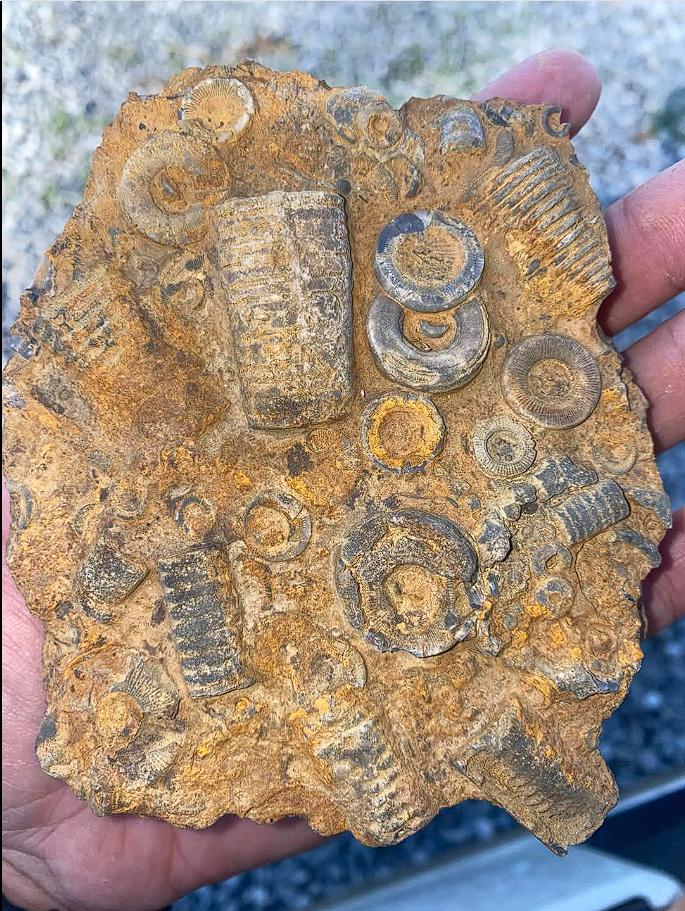On a seemingly ordinary day, July 16, 2023, a remarkable discovery unfolded on a ridge overlooking the winding course of the Cumberland River: a captivating cluster of crinoid fossils, tangible remnants of ancient sea creatures that thrived in the Earth’s oceans during an immense span of time stretching from the Ordovician to the Permian periods—an epoch roughly encompassing 485 to 251 million years ago. This unassuming find offers a profound connection to a world unimaginably distant from our own.
Unearthing Deep Time: A Devonian Formation Reveals Ancient Marine Life
According to the detailed information provided by the University of Kentucky’s interactive geological map, the specific ridge where this fascinating crinoid cluster was unearthed falls within a geological formation dating back to the Devonian period, a significant chapter in Earth’s history indicated by a distinctive red coloration on the map. More specifically, the area is identified as part of the New Albany Shale formation, a geological unit well-known for its characteristic layers of black and yellow shale, often visibly exposed along the dramatic cliff sides that define the region’s topography. This geological context provides crucial information about the age and environmental conditions under which these ancient crinoids once flourished.
Crinoids Through Time: Survivors of Ancient Seas
The crinoids themselves represent a lineage of marine organisms with an extraordinary evolutionary history, having first appeared during the Ordovician period and remarkably surviving multiple mass extinction events to persist in our modern oceans. Their fossil record provides invaluable insights into the biodiversity and ecological dynamics of ancient marine environments over hundreds of millions of years. This particular cluster offers a glimpse into a specific moment within that vast timeline.
The Devonian Period: A World of Ancient Oceans
The Devonian period, often referred to as the “Age of Fishes,” was a time of significant evolutionary diversification in marine life. The geological formations from this era, like the New Albany Shale, hold crucial clues about the types of organisms that inhabited the ancient oceans that once covered vast portions of the Earth’s continents, including what is now Kentucky. The discovery of these crinoids within this Devonian formation places them within this rich and dynamic prehistoric context.
The New Albany Shale: A Fossil-Rich Legacy
The New Albany Shale formation is renowned among paleontologists for its abundance of well-preserved fossils, offering a window into the ancient marine ecosystems that existed in this region during the Devonian period. The distinctive black and yellow shale layers are a testament to the specific environmental conditions—often characterized by low oxygen levels—that facilitated the preservation of delicate organic remains over millions of years. The crinoid cluster is a valuable addition to the fossil record of this significant formation.
A Quiet Testament: Whispers of a Long-Lost Marine World
This unassuming yet significant find of a crinoid cluster along a Kentucky ridge offers a small but remarkably clear window into the ancient marine environments that once teemed with life and completely covered what is now the familiar landscape of Kentucky. These fossilized remains serve as a quiet yet powerful testament to a world that vanished millions of years ago, a prehistoric realm now preserved in the silent language of stone. They are tangible links to a time when oceans stretched across the continent, teeming with now-extinct creatures, a profound reminder of the Earth’s dynamic and ever-changing history, long before the emergence of human civilization.

CÁC TIN KHÁC
Mary Walton: The Forgotten Inventor Who Helped Clean Up America’s Cities
Tomb of Queen Nefertari in the Valley of the Queens, Egypt
Discover the Hypostyle Hall of the Temple of Hathor at Dendera
Venus de Losange: Unveiling the Mystery of a 20,000-Year-Old Paleolithic Icon